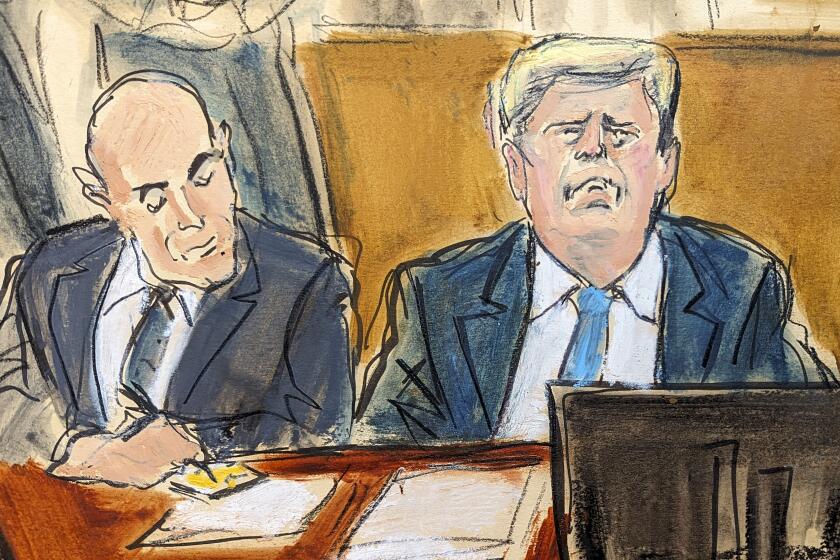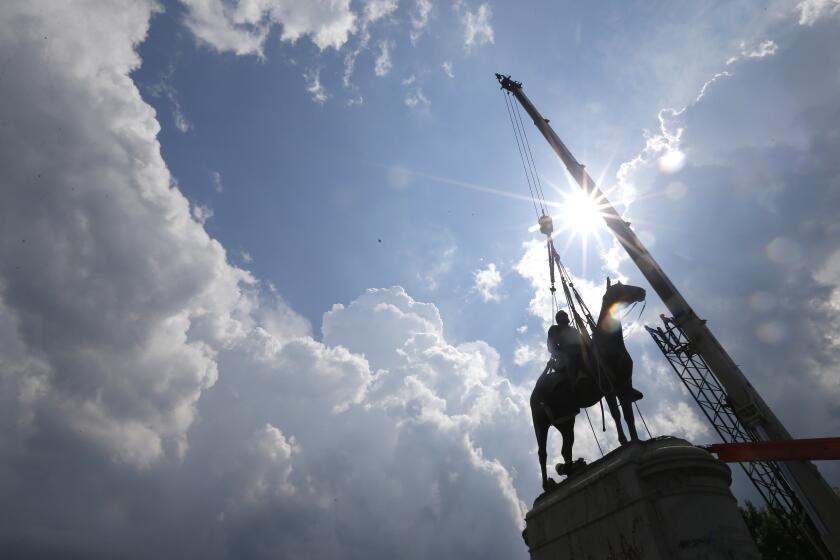Meese’s View That Court Doesn’t Make Law Scored
Atty. Gen. Edwin Meese III came under fire Thursday for his declaration earlier this week that the Constitution--and not necessarily the Supreme Court’s interpretation of the Constitution--determines the law of the land.
In the speech, delivered Tuesday night at Tulane University in New Orleans, Meese acknowledged that each Supreme Court decision binds “the parties in a case and also the executive branch for whatever enforcement is necessary. But such a decision does not establish a ‘supreme law of the land’ that is binding on all persons and parts of government, henceforth and forevermore.”
Some constitutional experts judged that position Thursday as a defensible one. But the American Civil Liberties Union said that Meese’s statement shows that he is “the most radical and dangerous attorney general in this century.”
And in much softer criticism, Eugene C. Thomas, president of the American Bar Assn., said in a statement that it is important for the public to understand that, Meese’s comments notwithstanding, “Supreme Court decisions are the law of the land, just as acts of Congress are the law of the land.”
In the speech, Meese underscored constitutional historian Charles Warren’s observation that, “however the court may interpret the provisions of the Constitution, it is still the Constitution which is the law, not the decisions of the court.”
Meese, who has been far more willing to publicly challenge high court rulings than his predecessors of the last 20 years, said: “Constitutional interpretation is not the business of the court only, but also, and properly, the business of all branches of government.”
Meese’s attempt to distinguish between the Constitution and constitutional law was assessed by Jesse H. Choper, dean of the University of California’s Boalt Hall School of Law in Berkeley, as raising “a profound question with eminent antecedents,” but one that takes on a special sensitivity because he is the nation’s top law enforcement officer.
Ira Glasser, the ACLU’s executive director, denounced Meese’s comments as “an invitation to lawlessness and a breach of constitutional duty to uphold the law.”
Glasser noted that Meese had chosen to attack the 1958 ruling in the case of Cooper vs. Aaron, in which the justices referred to their 1954 school desegregation ruling as the supreme law of the land and rejected attempts by Southern officials to defy it.
“Even the courts themselves have on occasion been tempted to think that the law of their decisions is on a par with the Constitution,” Meese said, citing the 1958 case as one in which “our highest court seemed to succumb to this very temptation.”
By siding with former Arkansas Gov. Orval E. Faubus, who tried to defy the desegregation ruling, Meese “abandons his constitutional duty to uphold the law and invites those who disagree with the Supreme Court to defy its rulings,” Glasser said.
Criticism Rejected
Terry Eastland, Meese’s chief spokesman, rejected Glasser’s criticism, contending that the attorney general was “not talking about the specific situation” in the 1958 case, but only about “what the court seemed to think of its own power.”
“The logic of Cooper vs. Aaron was, and is, at war with the Constitution, at war with the basic principles of democratic government and at war with the very meaning of the rule of law,” Meese said.
Choper said that “line by line” Meese’s speech “is a very carefully drafted” statement dealing with “a profound question of constitutional law. . . . But he’s not submitting it to get tenure on a university faculty. . . . Obviously, it has political ramifications.”
The Berkeley law dean offered this hypothetical example of what he said many would view as an appropriate challenge to a Supreme Court decision:
The Supreme Court upholds the constitutionality of a California law on drug testing. Congress then enacts an identical law applicable to federal employees. The President then vetoes the law, saying that he regards it as unconstitutional, despite the court’s ruling on the identical California law.
“Does that show disrespect of the President for the Supreme Court?” Choper asked. “A lot of people would say it was appropriate. There are a whole range of contexts like that.”
More to Read
Get the L.A. Times Politics newsletter
Deeply reported insights into legislation, politics and policy from Sacramento, Washington and beyond. In your inbox three times per week.
You may occasionally receive promotional content from the Los Angeles Times.






